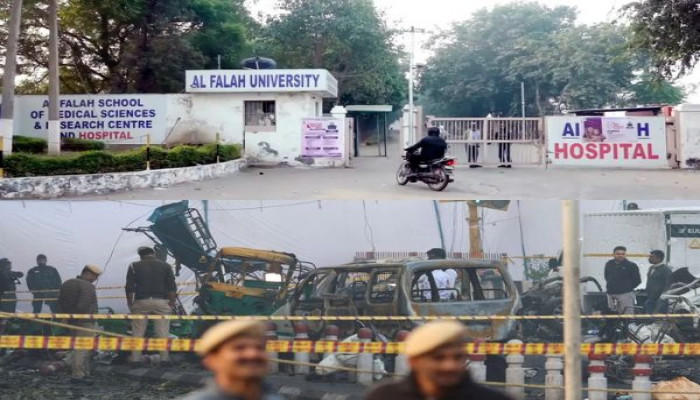Red Fort Blast probe: Al-Falah University gets fake NAAC accreditation show-cause notice
- In Reports
- 08:22 PM, Nov 13, 2025
- Myind Staff
Red Fort Blast probe: Al-Falah University gets fake NAAC accreditation show-cause notice
The National Assessment and Accreditation Council (NAAC) has issued a show-cause notice to Al-Falah University for making false and misleading claims about its accreditation on its website. This comes as the university remains under investigation after the recent Red Fort blast that killed 13 people.
In its notice issued on Thursday, NAAC confirmed that Al-Falah University "is neither accredited nor has ever applied for accreditation". Yet the university’s website continued to claim that three of its colleges under the Al-Falah Charitable Trust, including the Al-Falah School of Engineering and Technology since 1997 and the Al-Falah School of Education and Training since 2006, had been "Graded A by NAAC"
Calling the claims "absolutely wrong and misleading the public, especially parents, students, and stakeholders", NAAC asked the university to explain the matter immediately. It has also directed Al-Falah to remove all references to NAAC accreditation from its website, brochures and any admission-related material
Accreditation from NAAC is an important quality mark for Indian universities as it impacts student admissions, teacher recruitment, research grants and regulatory permissions.
Making false accreditation claims is a serious breach of UGC regulations, as it misleads students and gives an institution an unfair advantage over others.
The notice comes just days after the Red Fort car blast in Delhi, where a high-intensity explosion killed 13 people and injured many others. Hours before the blast, central agencies had said they had uncovered what they called a "white-collar terror module". Among those arrested were three doctors linked to Al-Falah University, leading investigators to take a closer look at the institution.
Officials said the NAAC notice is separate from the ongoing terror probe, but added that "regulatory compliance and institutional transparency come under sharper focus when an institution is already in the public eye for unrelated but serious matters".
The university has been asked to respond within a set time frame. Failure to do so could invite further action, including censure or referral to the UGC.
Meanwhile, the Red Fort blast investigation has widened to include Javed Ahmed Siddiqui, the founder and managing trustee of Al-Falah University. Two of the three main suspects, Dr Shaheen Saeed and Dr Mujammil Shakeel, worked at the university
The university is also being probed by the Enforcement Directorate for alleged financial irregularities. Sources told NDTV that Siddiqui’s "vast corporate network" and an old criminal case involving fraud worth Rs 7.5 crore are now key parts of the wider investigation.
Al-Falah University’s legal advisor, Mohd Razi, denied all the fraud allegations against Siddiqui, including the Rs 7.5 crore case. He also said he had "no information" about the hiring of Shakeel and explained that recruitment and verification of staff were the Vice Chancellor’s responsibility.
Siddiqui, who was born in Mhow, Madhya Pradesh, sits on the board of nine companies all linked through the Al-Falah Charitable Trust, which manages the university. These companies operate in sectors like education, software, finance and energy and most share the same address- the Al-Falah House in Jamia Nagar, Okhla.
These companies include Al-Falah Investment, started in 1992, Al-Falah Medical Research Foundation, where Saeed and Shakeel allegedly met to plan a 32-car serial bomb plot, Al-Falah Developers Pvt Ltd, Al-Falah Industrial Research Foundation, Al-Falah Education Service Pvt Ltd, MJH Developers Pvt Ltd, Al-Falah Software Pvt Ltd, Al-Falah Energies Pvt Ltd and Tarbia Education Foundation.
Most of these firms stayed active until 2019 before closing down. The Al-Falah Medical Research Foundation, however, grew steadily. It began as an engineering college in 1997 and now runs on a 78-acre campus. But is currently under NAAC investigation for fake accreditation claims.
The Al-Falah House also serves as the office of the Al-Falah Charitable Trust. The old fraud case against Siddiqui was filed at the New Friends Colony Police Station in Delhi. The complaint accused him and his partners of setting up fake investment schemes under the Al-Falah group and convincing people to deposit money, which was later shown as forged share certificates. The collected Rs 7.5 crore was then diverted to their personal accounts.
Siddiqui was arrested in 2001 and in 2003, the Delhi High Court rejected his bail plea, citing forensic proof that the signatures on share certificates were forged. He was granted bail in 2004 only after agreeing to refund the defrauded investors.
In January 2020, Delhi Police again raided the Okhla office after new complaints that Siddiqui had cheated more investors most of them from poor Muslim families, who were lured into investing in so-called halal schemes.
The Red Fort blast involved a white Hyundai i20 filled with ammonium nitrate and fuel oil. The car exploded at a busy junction, killing 13 people. Investigators said it was part of a larger terror plan involving 32 cars meant for serial blasts across Delhi as revenge for the Babri Masjid demolition. The car was driven by Umar Mohammad, a terrorist linked to the Pakistan-based Jaish-e-Mohammed.
As the investigation deepens, the false accreditation row and old fraud allegations have raised serious questions about Al-Falah University’s governance and whether stronger checks on private universities will now follow.







Comments